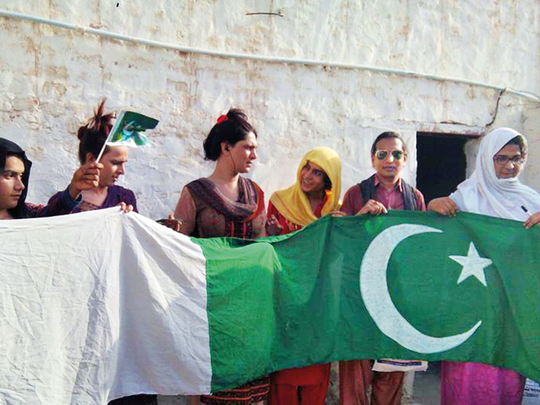
Islamabad: When young Marvia made her first appearance as a news anchor, it was not only an emotional moment for her but also for Pakistan’s long-shunned transgender community, which she belongs to.
In the young, confident and graceful individual, the country’s largely ignored third gender community saw a figure of courage who broke stereotypes and offered hope for her fraternity to step out of the
shadows and chase their dreams.
Marvia Malik |
For Malik, it has been a long journey. The 21-year-old has gone from being a make-up artist to a catwalk model to a TV news anchor — finally becoming the face of her community.
“I always wanted to do something for my community members who face discrimination at every level. Every transgender has to go through the same degree of suffering as we are shunned by our families and society,” Malik told Gulf News.
Long ago Malik decided not to end up stuck in the traditional roles others of her ilk perform for a livelihood — dancing, begging or selling her body.
“My family supported me up to my early education and later on, I graduated in journalism on my own.”
She is of the firm belief that there is nothing a transgender cannot achieve if they have the education and the opportunities. On March 23 this year, her dream became a reality when she was hired by a private broadcaster Kohenoor TV in Lahore.
The public outpouring of support for her was overwhelming. Even the TV channel which hird her was showered with praise for its decision to empower transgender individuals, so much so that it went on to hire another transgender person.
“After Marvia, we hired Veena on the copy editing desk and why not?” remarked Bilal Ashraf, Kohenoor TV News Director.
Malik and the TV channel are hopeful that the media can help change the negative perceptions and stereotypes transgender people face in society.
A timeless bias
Malik is a member of Pakistan’s ‘third gender’ community, called ‘khawaja sira’ in Urdu — a word that encompasses transvestites, transsexuals, transgenders, eunuchs, and intersex (hermaphrodites).
They all face ostracism, abuse and a deeply troubled childhood.
Transgender people are typically confused for intersex individuals, who represent a very small percentage of the transgender group. An estimated one in 2,000 births results in an intersex child, according to a global survey.
Even as individuals such as Malik are forging ahead and making society introspect, the bias against their community remains.
“I just can’t stand them but I don’t like to mess with hijras as I am afraid of getting cursed by them,” said Saima Haroon, a teacher.
Saba Khan, a sociologist, said, “In Pakistan, they have this status as people who have the powers to bless and curse which is why we see them mostly at wedding ceremonies or when children are born.”
“[It] requires both legal and mindset changes to be eliminated,” said Qamar Naseem, Program Coordinator of Blue Veins that works for trans people.
“The legislative reform in Pakistan has so far benefited the elite transgender community but has hardly offered any protection to most khawaja siras who face lot of abuse,” said Naseem.
Since January 2015, at least 55 transgenders have been murdered in Khyber Pakhtunkhwa, according to Trans Action Pakistan. “Most became a victim of fights or hated within the community while others [were killed] out of shame,” Naseem added.
Despite promising laws, and the heart-warming stories of courage of individuals such as Malik, the struggle of Pakistan’s trans community seems far from over.












